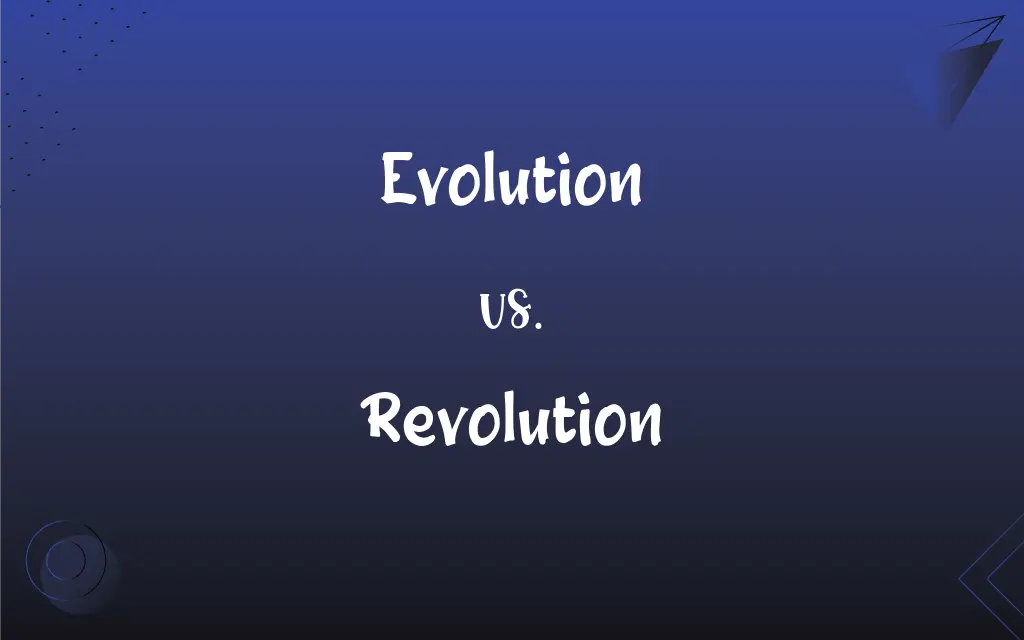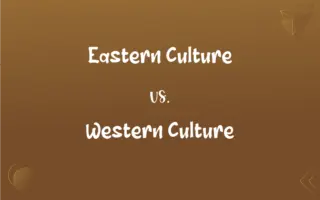Evolution vs. Revolution: What's the Difference?
Edited by Aimie Carlson || By Harlon Moss || Updated on October 17, 2023
Evolution is gradual change; revolution is abrupt, radical change. Evolution is like water shaping a canyon; revolution is an earthquake.

Key Differences
Evolution, in general, refers to a slow, gradual, and continuous process of change over time. Think of how species adapt and change subtly from generation to generation. On the other hand, revolution implies sudden, drastic change, often in a short period. It's comparable to a regime change following an uprising.
Evolution often indicates a natural, progressive, and adaptive course, not driven by preordained direction but by survival. It's how organisms grow more complex or better suited to their environments. Conversely, revolution involves deliberate attempts at massive shifts, overthrowing established systems in favor of new structures, like political uprisings leading to entirely new governments.
Evolution is often silent, nearly imperceptible as it occurs, like languages slowly transforming over centuries. Revolution is loud, chaotic, and usually highly noticeable while it's happening, akin to the rapid societal changes during the industrial revolution.
Evolution, by its nature, suggests a biological or cultural lineage that traces changes through an extended period, a slow reshaping of the status quo. Revolution speaks to a break from the past, a clear delineation between "before" and "after," a swift pivot that's often reactive to oppression or injustice.
Evolution can be seen as a conservative force in that it conserves the continuity of change, building upon the old to create the new. In contrast, revolution is a disruptive force, seeking to dismantle the old system entirely and replace it with something new, often with a vision of a better future in mind.
ADVERTISEMENT
Comparison Chart
Speed
Gradual
Rapid
Nature
Progressive
Radical
Perception
Subtle
Noticeable
Continuity
Builds on past
Breaks from past
Outcome
Adaptive change
Overhaul
ADVERTISEMENT
Evolution and Revolution Definitions
Evolution
Evolution is the process of change in all forms of life over generations.
The evolution of humans from ancient hominids has been a subject of great interest and study.
Revolution
Revolution is the instance of revolving, or moving in a circular or curving course, around an axis or center.
The revolution of the Earth around the Sun gives us our seasons.
Evolution
Evolution is the gradual development of something, from simple to more complex.
The evolution of technology from the industrial age to the digital age is truly remarkable.
Revolution
Revolution refers to a dramatic and wide-reaching change in conditions, attitudes, or operation.
The digital revolution transformed how we access information and communicate.
Evolution
Evolution refers to the process through which species adapt to their environments for survival.
The evolution of resistant bacteria is a growing concern for global health.
Revolution
Revolution means a fundamental change in power or organizational structures that takes place in a relatively short period of time.
The cultural revolution in the 1960s changed many societal norms.
Evolution
Evolution is a slow, progressive change in ideas, practices, or methods.
The evolution of democratic principles has shaped modern societies.
Revolution
Revolution is a procedure or course, as if in a circuit, back to a starting point.
The revolution of the hands on a clock marks the passage of time
Evolution
Evolution signifies the cumulative changes within cultural or societal norms over time.
The evolution of fashion trends reflects broader cultural shifts.
Revolution
Revolution is a forcible overthrow of a government or social order, in favor of a new system.
The French Revolution was a period of radical social and political upheaval in France.
Evolution
A gradual process in which something changes into a different and usually more complex or better form.
Revolution
Orbital motion about a point, especially as distinguished from axial rotation
The planetary revolution about the sun.
Evolution
A result of this process; a development
Judo is an evolution of an earlier martial art.
Revolution
A turning or rotational motion about an axis.
FAQs
Is evolution always slow?
Typically, yes, evolution is a process that happens over generations, but the rate can vary depending on the context.
Do evolution and revolution mean the same thing?
No, evolution refers to a gradual change over time, while revolution refers to sudden, significant change or an overthrow of a system.
Are all revolutions violent?
No, revolutions can be peaceful, like the Velvet Revolution in Czechoslovakia, or technological, like the Digital Revolution.
Does evolution only apply to biological organisms?
No, evolution can also describe gradual changes in technology, culture, and societal norms.
How does cultural evolution differ from biological evolution?
Cultural evolution involves changes in societal norms and knowledge, while biological evolution refers to changes in genetic traits.
What's an example of a non-political revolution?
The Industrial Revolution, which was a period of massive technological and societal change.
Does evolution have a specific direction or goal?
No, evolution is not goal-oriented; it's a natural process based on variation, mutation, and natural selection.
Can revolution result in regression or negative outcomes?
Yes, revolutions can sometimes lead to instability, conflict, or setbacks, depending on various factors.
Do revolutions always lead to better outcomes?
Not always. While many aim for positive change, the outcomes of revolutions can be unpredictable.
Can evolution be observed in real time?
Yes, certain instances of evolution, like virus mutations or bacteria becoming antibiotic-resistant, can be observed in real time.
What typically triggers a revolution?
Revolutions are usually triggered by societal discontent, perceived injustice, or the desire for political, social, or technological change.
Can evolution lead to revolution?
Yes, prolonged periods of evolution can accumulate tensions or advancements that spark a revolution.
Is evolution a theory or a fact?
Evolution is both a theory and a fact. It's a fact that species change over time, and the theory explains how and why this change occurs.
How do revolutions end?
Revolutions typically end when a new stable order is established, or when the revolutionary movement is suppressed or dissipates.
What's the role of mutation in evolution?
Mutations introduce genetic variation, without which evolution by natural selection couldn't occur.
Can a revolution be a cycle?
Yes, some revolutions are cyclical, with changes repeating in a pattern, like those in fashion or technology trends.
What's a common misconception about revolution?
A common misconception is that all revolutions are rapid; some can unfold over many years.
Are humans the pinnacle of evolution?
No, evolution doesn't have a pinnacle; it's an ongoing process, and no species is perfect for every environment.
Are revolutions only about power?
While power dynamics are central, revolutions can also encompass social, technological, and cultural changes.
Is human evolution still occurring?
Yes, humans continue to evolve, though these changes might be subtle and occur over long periods.
About Author
Written by
Harlon MossHarlon is a seasoned quality moderator and accomplished content writer for Difference Wiki. An alumnus of the prestigious University of California, he earned his degree in Computer Science. Leveraging his academic background, Harlon brings a meticulous and informed perspective to his work, ensuring content accuracy and excellence.
Edited by
Aimie CarlsonAimie Carlson, holding a master's degree in English literature, is a fervent English language enthusiast. She lends her writing talents to Difference Wiki, a prominent website that specializes in comparisons, offering readers insightful analyses that both captivate and inform.































































